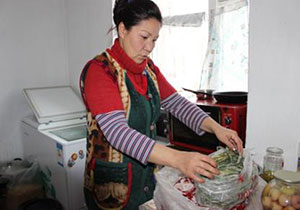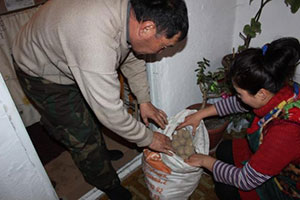Community Activists in the Kyrgyz Republic Improve Food-buying Habits

Nazira Subankulova lives with her family in the rural village of Aral in Naryn oblast. She runs her own grocery store, and volunteers as a community “activist” with SPRING. SPRING is teaching “activists” in Naryn and Jalalabad oblasts about exclusive breastfeeding of infants through six months of age, complementary feeding after six months, handwashing, dietary diversity, and other ways to improve child nutrition. In turn, community activists relay this information to their neighbors at community meetings and when they visit “1,000-day households” (homes with a pregnant or lactating woman and/or a child under two years).
As a volunteer, Nazira spends several hours a week visiting neighbors and hosting meetings to talk about nutrition based on what she learned from SPRING. She distributes reading material, such as a food pyramid diagram and a cookbook that SPRING produced, to families with pregnant women or young children to encourage them to try nutritious foods in new ways. Like other volunteers, Nazira helps friends and neighbors understand the small things they can do to improve the nutrition and health of their families, such as reducing the amount of junk food children eat.
Nazira credits the demand for fresh vegetables and fruits to the messages that SPRING began promoting in 2014.

As a grocery store owner, Nazira has noticed a marked shift in the food buying habits within her community. A year ago, her neighbors primarily purchased chips, sausages, instant noodles, salted crackers, and other pre-packaged products. Now she can’t keep enough vegetables on the shelves because they are so popular.
She credits the demand for fresh vegetables and fruits to the messages SPRING began promoting in 2014. Nazira says that because of SPRING’s focus on promoting local foods, dietary diversity, and nutrition, mothers pay more attention to family meals and purchase healthier products. Nazira has happily changed her store stock to include more fresh fruits and vegetables to reflect this beneficial shift.